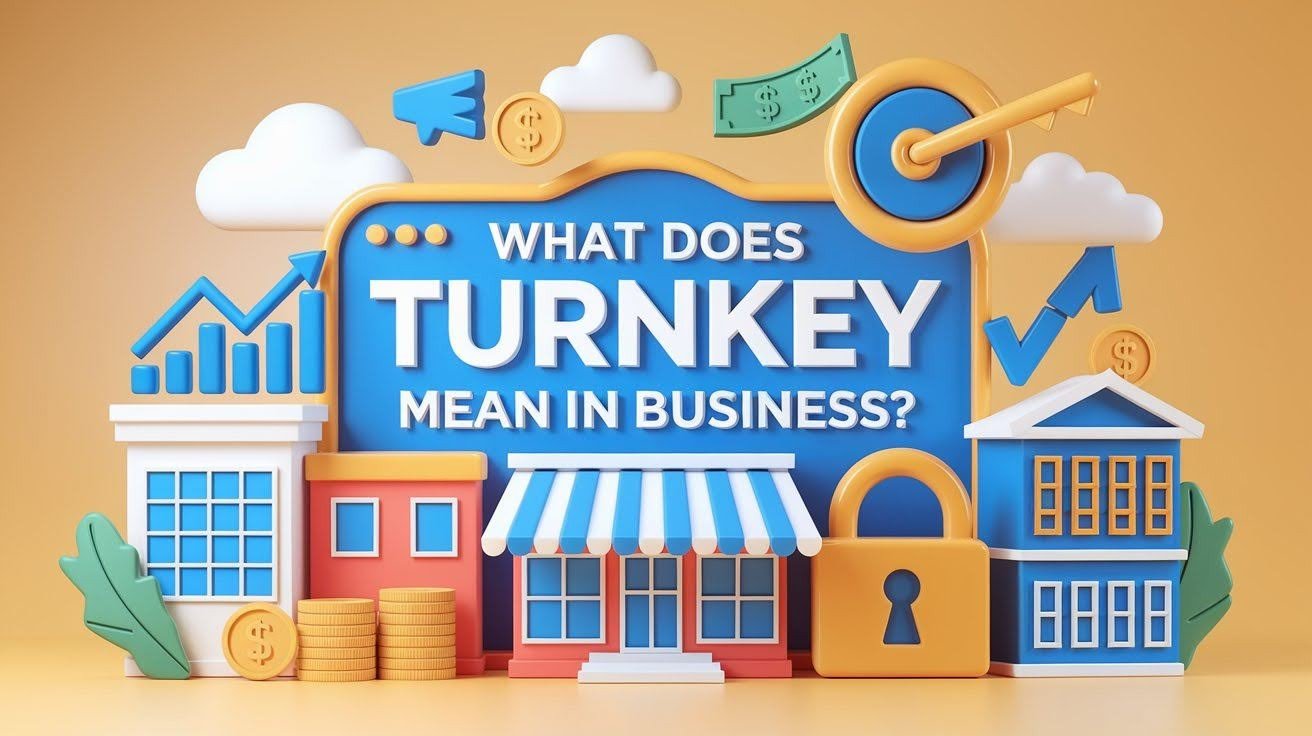The word “turnkey” means just like turning a key to start a car, ready to use right away.
In business, such a turnkey business works in just the same way. Since the setup exists, operation from day one is prepared for the company.
I’ll explain the reasons why more people choose a turnkey business and what makes this path appealing. You’ll learn about whether this model fits your goals, risks, advantages, and different types.
This guide covers franchises, dropshipping, and online businesses. Real estate is also going to be covered. You will know near the end if such a turnkey business is the right choice for you. Let’s find your options.
What Is a Turnkey Business?

A turnkey business is a company that’s completely set up and ready to operate when you buy it. The name comes from the idea that you just turn a key and start making money.
Everything from equipment and training to suppliers and systems is already in place.
Common examples include franchises like McDonald’s or Subway, which provide proven business models and complete training.
Multi-level marketing companies like Mary Kay offer starter kits so you can start selling immediately.
Turnkey rental properties come fully renovated with tenants and property management included. Automated e-commerce stores arrive with existing traffic, products, and revenue already flowing.
How Turnkey Businesses Work

Sellers prepare everything, including operations, suppliers, and location setup. Buyers invest capital, manage daily operations, and can make improvements over time.
Set up and Preparation by the Seller
The seller handles all groundwork before you take over. They create operations plans, select products, establish supplier relationships, and set up the location.
Equipment, inventory, and systems are ready to go. Many provide training materials or transition support.
Role of the Buyer
You invest the capital to purchase the business and handle day-to-day operations. This includes managing customers, employees, and inventory.
The framework is ready, but you’re in charge and can make improvements over time.
Turnkey Business vs. Franchise
Both turnkey businesses and franchises offer ready-made opportunities, but they work differently. Understanding these differences helps you choose the right path for your goals and how much control you want over operations.
|
Feature |
Turnkey Business |
Franchise |
|
Business Model |
Ready-made and operational |
Ready-made and operational |
|
Brand Recognition |
May or may not have established brand |
Always has an established brand name |
|
Suppliers |
Pre-arranged supplier relationships |
Corporate-approved suppliers only |
|
Operating Procedures |
Predefined systems provided |
Strict procedures you must follow |
|
Operational Control |
More freedom to make changes |
Limited control, must follow franchise rules |
|
Decision Making |
You decide pricing, marketing, and hours |
The corporation controls most decisions |
|
Location Requirements |
Flexible (physical or online) |
Often requires an approved location |
|
Ongoing Fees |
Typically one-time purchase |
Ongoing royalties and franchise fees |
|
Training & Support |
Varies by seller |
Comprehensive training required |
|
Branding Changes |
You can rebrand if desired |
Cannot change brand elements |
|
Exit Strategy |
Sell to anyone willing to buy |
Must sell to franchisee-approved buyer |
Advantages of Turnkey Businesses

Turnkey businesses offer proven models, existing customers, training support, faster startup, and easier financing with established financial records for lower risk.
Proven Business Model
You’re buying a system that already works. Someone else tested the concept and figured out what customers want. This reduces startup risks, and you can review sales history and profit margins before investing.
Built-in Customer Base
The business comes with existing customers who buy regularly. You generate revenue from day one instead of spending months building awareness. Marketing is easier because customers already know what you offer.
Support and Guidance
Most turnkey businesses include training and operational advice. Franchises provide ongoing support through corporate teams. Even independent sellers often stay available during your transition period to answer questions.
Faster Startup and Reduced Research
You skip months of research. Employees are hired and trained. Supplier relationships exist with negotiated pricing. Systems like inventory management and accounting software are already working, so you can open within days.
Easier Financing
Banks prefer businesses with track records. Existing financial statements show cash flow and profit margins, making it easier to secure loans compared to pitching an untested idea.
Disadvantages of Turnkey Businesses

Turnkey businesses have high initial costs, limited flexibility, risks of hidden issues, and challenges adapting operations to match your personal vision.
High Initial Costs
Successful turnkey businesses command premium prices because they’re already profitable. If you find a cheap option, be cautious, as low prices often signal hidden problems like declining sales or legal issues.
Limited Flexibility
Franchises restrict many decisions. You must use approved suppliers, follow corporate rules on hours and marketing, and you can’t change branding without permission. This lack of control frustrates owners who want independence.
Risk of Hidden Issues
Not everything is visible during purchase. Staff might quit after ownership changes. The equipment could be near failure. The business might carry hidden debt or manipulated financial records that make revenue look better than it is.
Challenges in Making It Your Own
Adapting the business to your vision takes time and money. Changing systems creates employee resistance. Rebranding requires new materials and risks losing customers. Franchises often prohibit major changes entirely.
Turnkey Properties

- Turnkey properties are real estate investments that generate income immediately with no work required from you.
- These fully renovated homes or apartments come with tenants already in place and lease agreements that transfer at closing.
- All renovations, including new roofs, updated kitchens, and modern appliances, are complete before purchase.
- Property management companies handle tenant screening, rent collection, repairs, and complaints, so you avoid daily operations.
- This model is ideal for investors seeking passive income without landlord experience or needing to live near the property.
- You gain time and convenience, though profit margins are lower since you’re paying for these services.
Is a Turnkey Business Right for You?

Consider your investment capital, time availability, experience level, and risk tolerance. Turnkey businesses require significant upfront money but offer faster returns with proven models.
Starting from scratch costs less initially but takes years and has higher failure rates. Franchises provide training but limit control, while independent businesses offer freedom with higher uncertainty.
Never buy based on the seller’s word alone. Hire an accountant to review financial statements, talk to customers and employees separately, and visit the location multiple times.
Verify contracts and investigate legal issues. Thorough due diligence prevents costly surprises.
Conclusion
Now you understand just what turnkey means in business, as well as what different types exist. Though costly with limits, turnkey businesses provide systems that are proven and quick.
These work well in the event that you want to earn faster than before and skip the startup.
For investing it requires doing thorough research before it.
Speak to the current owners and carefully review finances. It is important to be honest about what you can do and want.
Are turnkey options up for exploration? In the comments below, share the type among the options. I’d appreciate any feedback.
Frequently Asked Questions
What does turnkey mean in business?
Turnkey means a business that’s completely set up and ready to operate when you buy it. You start generating revenue immediately without building from scratch.
How much does a turnkey business cost?
Costs vary widely by type and success. Small online businesses start around $10,000, while franchises can cost $100,000 to several million dollars.
What’s the difference between a turnkey business and a franchise?
Both are ready-made, but franchises require ongoing fees and strict corporate rules. Independent turnkey businesses offer more freedom without royalty payments.
Are turnkey businesses less risky than startups?
Yes, they carry lower risk with proven track records and existing customers. However, due diligence is still essential to avoid hidden problems.
Can I customize a turnkey business after buying it?
Independent turnkey businesses allow modifications with time and investment. Franchises restrict most customization and require following established systems.









